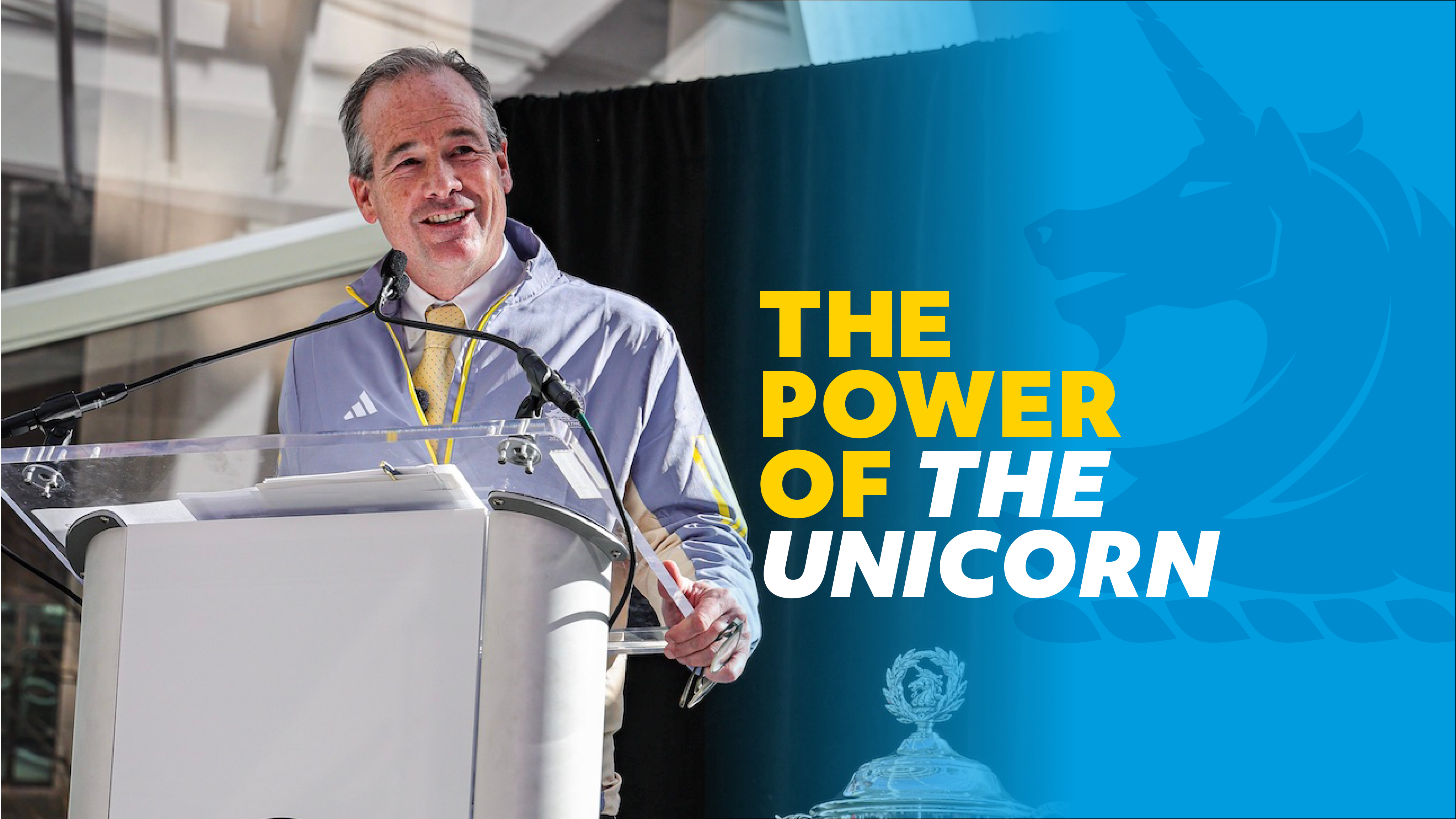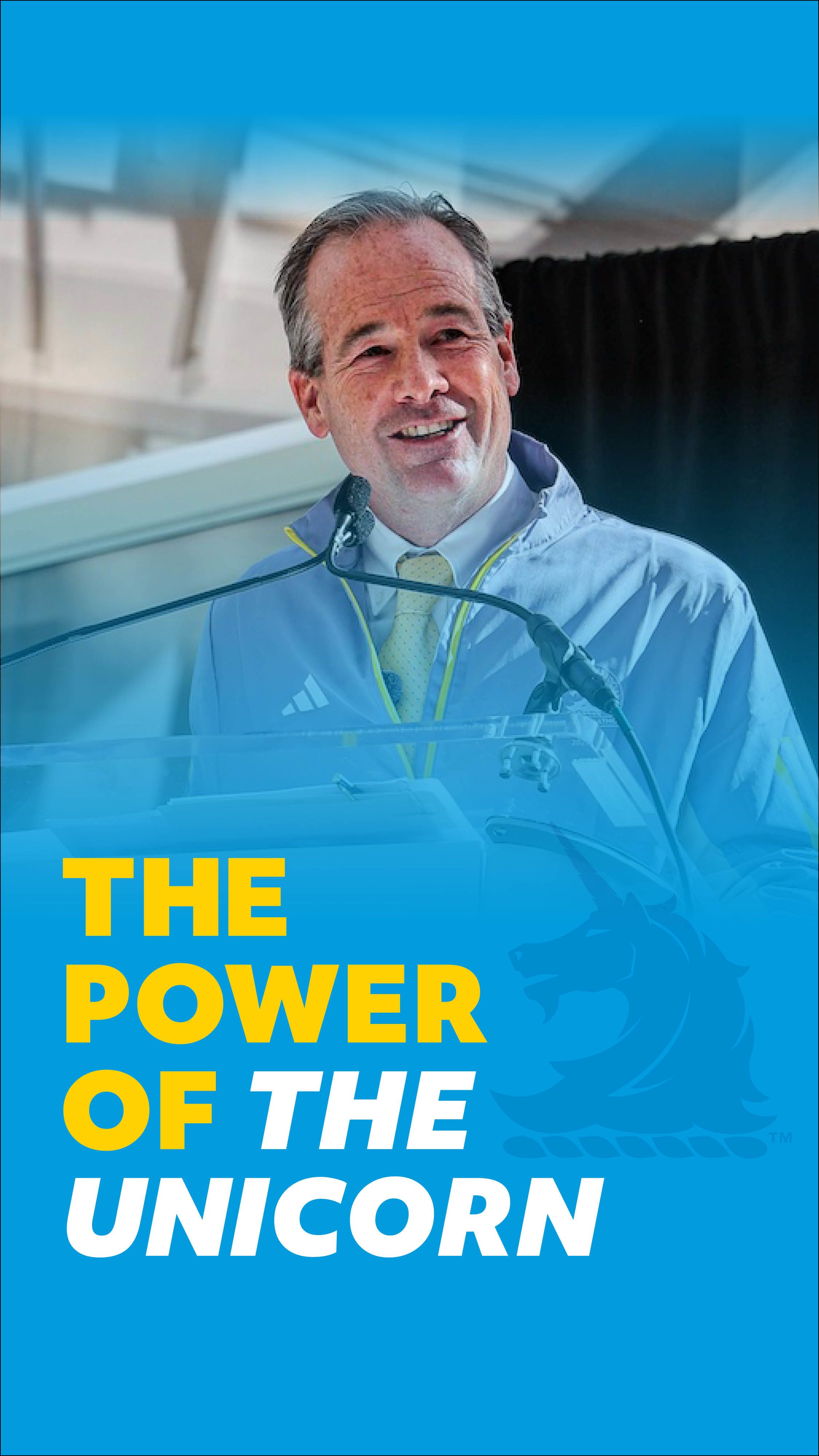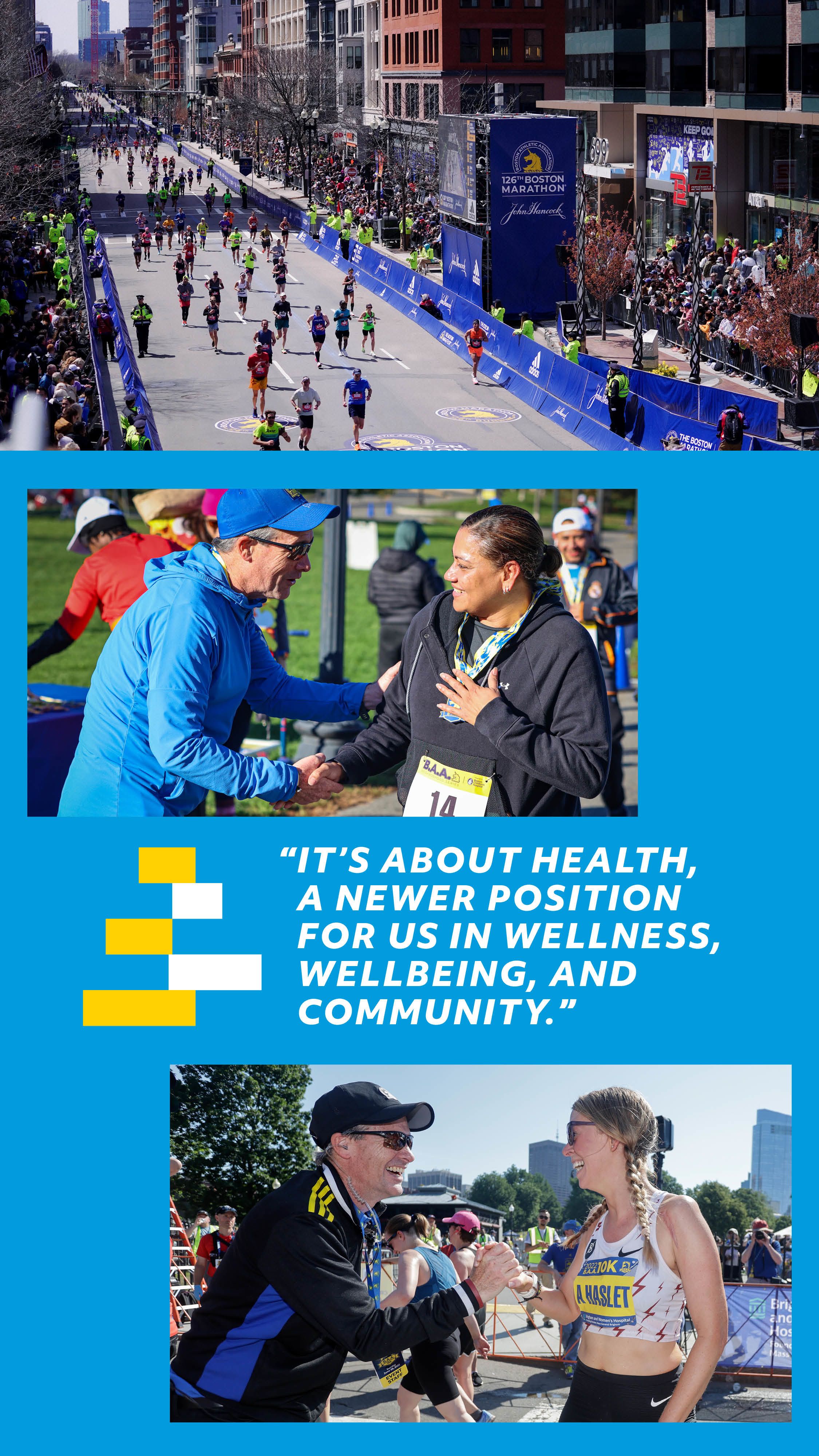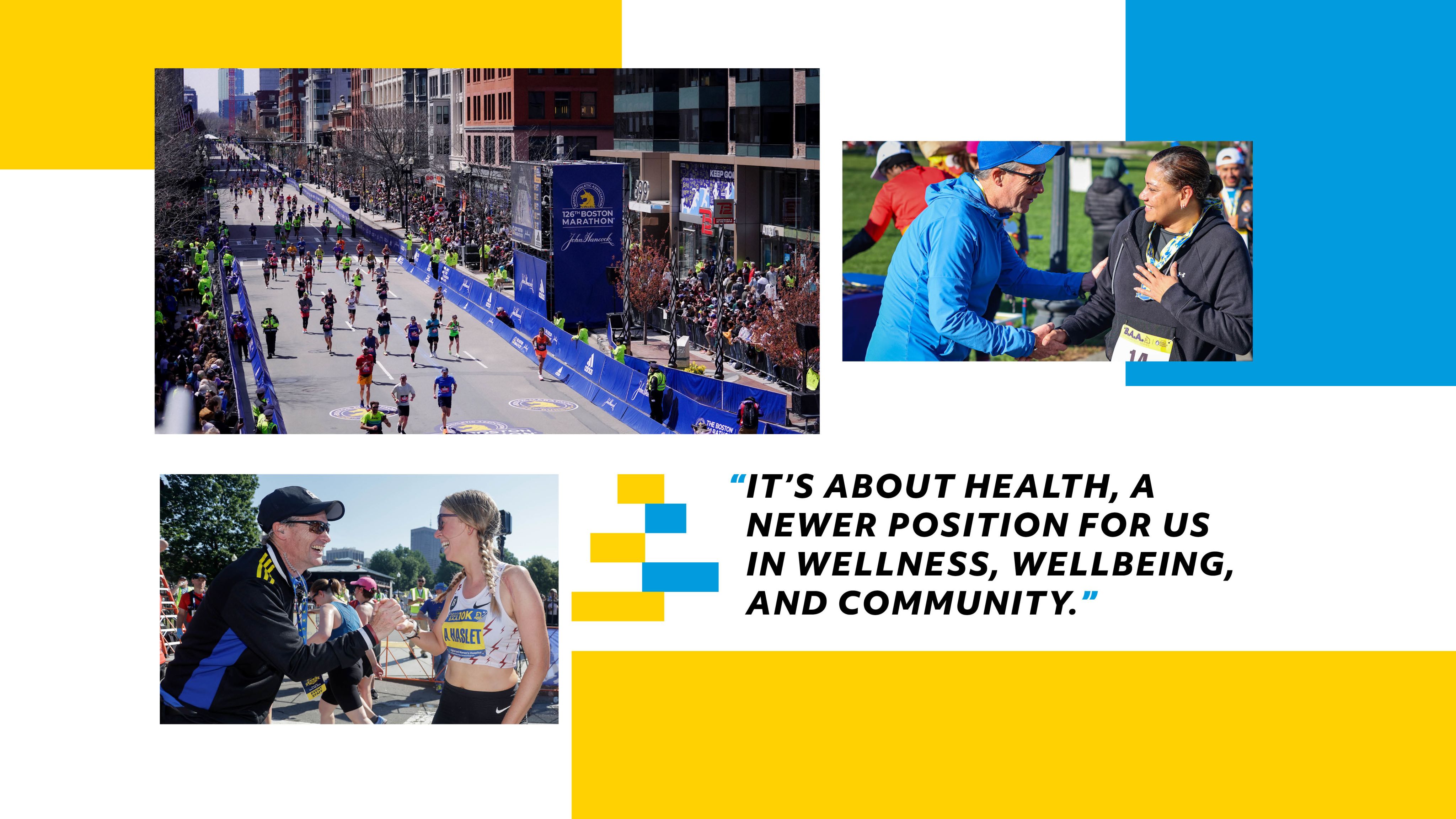

The Boston Marathon is about more than just race day. MAJORS meets the B.A.A.’s new CEO to find out more
WORDS: DAWNA STONE
On the wall behind Jack Fleming as he settles into his chair for a chat with MAJORS is a framed artist’s depiction of Boylston Street.
It’s possibly the most famous stretch of asphalt in all of marathon running. It’s certainly got the longest history.
When more than 30,000 runners stream down that road each Patriot’s Day the eyes of the running world are focused on them. After 127 years, if the tarmac could talk, it would have enough stories to fill the pages of a dozen weighty tomes.
But the home straight of the world’s oldest continuously held marathon is, as the new CEO of the Boston Athletic Association is keen to stress, just the very tip of a gigantic blue and yellow iceberg.
Beneath the surface is an organization whose goal is to spread the aura and inspiration generated by the scenes we see on the middle Monday of April to deliver a real impact on the communities that surround the 26.2-mile route.
“We’re a club,” says Fleming. “I realize we are thought of as an event organization that produces the Boston Marathon. But I started here as a B.A.A club member, and at the heart of it, still, we are a club, full stop. I’ll never forget the first assignment I had. I had to come up with the next iteration of the Unicorn newsletter for the running club.”
Were he to sit down and fill that same newsletter today, it would be with the message that the B.A.A is on a mission not just to retain and enhance the marathon’s status as one of the greatest races on the planet, but to inspire a healthy lifestyle through activity in the dozens of towns and cities in Boston’s orbit.

“That’s a strong aspect for us,” he says. “You have a real sense at all our events how enthusiastic the volunteers, businesses, neighbors and communities are. We must acknowledge this enthusiasm and desire to participate with us and create open doors for that to continue. We have to further strengthen these access points for people to keep going in terms of their participation with us.”
It feels as though this will be the central tenet to Fleming’s tenure in the CEO’s chair, a position he assumed following the departure of the great Tom Grilk at the end of 2022.
It’s an ethos shared in different guises and manifested through different outcomes at all six Abbott World Marathon Majors. See London’s incredible charity fundraising power or New York Road Runners’ numerous tentacles spreading out into its community.
These are movements that can have real-world impact beyond the annual accomplishment of tens of thousands of runners crossing those finish lines.
Fleming wants to ensure that the magnetism of the B.A.A.’s signature event attracts not just the highly-valued runners who spend years chasing the marathon time they need to qualify for a place, but also pulls in people for whom 26.2 miles may as well be as far away as the moon.
When he talks about participation, he’s not just talking about running a marathon.
“We have a premier event, one of the world’s greatest marathons. That draws you in. A lot of people want to have some of that aura, but can’t do a marathon, and that’s OK. You can participate by volunteering, or supporting someone else, or maybe doing the half marathon or 10K or 5K or volunteering at one of those.
“We are involved in more local, neighbourhood community events on the introductory side to the sport. We realize that the idea of the marathon can be a bit too far out of reach for some.”
To this end, the Boston Running Collaborative was launched in 2021 to bring together organizations and individuals committed to increasing diversity in the city’s running community, focusing on improving health and wellness and expanding access to running and walking in Boston in communities of color.
The B.A.A.’s Neighborhood Fitness Series was also launched in October 2022 to offer one and two-mile run/walks and introductory sessions to other athletic disciplines.
In 2023 there will be five new community events in areas of Great Boston where the B.A.A. has never set foot.
“If we are to broaden, we need to be in these neighbourhoods,” says Fleming. “When that’s successful we’ll then decide whether we want to replicate in other areas around Boston or want to explore the idea of replicating similarly in other towns in Massachusetts.
“When kids earn their first unicorn (medal), we like to think that’s on their bed post, or nightstand or even in a shoebox, forever. We like to think that has done something to empower them to do the next thing. That’s the whole ethos of this idea of the pursuit of the unicorn - start somewhere and continue to pursue that.
“It’s about health, a newer position for us in wellness, wellbeing, and community. There aren’t hundreds of organizations such as ours. We are the one in our area and we have to realize that we have a responsibility to use that position for good. I think that captures how we think of ourselves as an organisation.”
WORDS: DAWNA STONE
On the wall behind Jack Fleming as he settles into his chair for a chat with MAJORS is a framed artist’s depiction of Boylston Street.
It’s possibly the most famous stretch of asphalt in all of marathon running. It’s certainly got the longest history.
When more than 30,000 runners stream down that road each Patriot’s Day the eyes of the running world are focused on them. After 127 years, if the tarmac could talk, it would have enough stories to fill the pages of a dozen weighty tomes.
But the home straight of the world’s oldest continuously held marathon is, as the new CEO of the Boston Athletic Association is keen to stress, just the very tip of a gigantic blue and yellow iceberg.
Beneath the surface is an organization whose goal is to spread the aura and inspiration generated by the scenes we see on the middle Monday of April to deliver a real impact on the communities that surround the 26.2-mile route.
“We’re a club,” says Fleming. “I realize we are thought of as an event organization that produces the Boston Marathon. But I started here as a B.A.A club member, and at the heart of it, still, we are a club, full stop. I’ll never forget the first assignment I had. I had to come up with the next iteration of the Unicorn newsletter for the running club.”
Were he to sit down and fill that same newsletter today, it would be with the message that the B.A.A is on a mission not just to retain and enhance the marathon’s status as one of the greatest races on the planet, but to inspire a healthy lifestyle through activity in the dozens of towns and cities in Boston’s orbit.
“That’s a strong aspect for us,” he says. “You have a real sense at all our events how enthusiastic the volunteers, businesses, neighbors and communities are. We must acknowledge this enthusiasm and desire to participate with us and create open doors for that to continue. We have to further strengthen these access points for people to keep going in terms of their participation with us.”
It feels as though this will be the central tenet to Fleming’s tenure in the CEO’s chair, a position he assumed following the departure of the great Tom Grilk at the end of 2022.
It’s an ethos shared in different guises and manifested through different outcomes at all six Abbott World Marathon Majors. See London’s incredible charity fundraising power or New York Road Runners’ numerous tentacles spreading out into its community.
These are movements that can have real-world impact beyond the annual accomplishment of tens of thousands of runners crossing those finish lines.
Fleming wants to ensure that the magnetism of the B.A.A.’s signature event attracts not just the highly-valued runners who spend years chasing the marathon time they need to qualify for a place, but also pulls in people for whom 26.2 miles may as well be as far away as the moon.
When he talks about participation, he’s not just talking about running a marathon.
“We have a premier event, one of the world’s greatest marathons. That draws you in. A lot of people want to have some of that aura, but can’t do a marathon, and that’s OK. You can participate by volunteering, or supporting someone else, or maybe doing the half marathon or 10K or 5K or volunteering at one of those.
“We are involved in more local, neighbourhood community events on the introductory side to the sport. We realize that the idea of the marathon can be a bit too far out of reach for some.”

To this end, the Boston Running Collaborative was launched in 2021 to bring together organizations and individuals committed to increasing diversity in the city’s running community, focusing on improving health and wellness and expanding access to running and walking in Boston in communities of color.
The B.A.A.’s Neighborhood Fitness Series was also launched in October 2022 to offer one and two-mile run/walks and introductory sessions to other athletic disciplines.
In 2023 there will be five new community events in areas of Great Boston where the B.A.A. has never set foot.
“If we are to broaden, we need to be in these neighbourhoods,” says Fleming. “When that’s successful we’ll then decide whether we want to replicate in other areas around Boston or want to explore the idea of replicating similarly in other towns in Massachusetts.
“When kids earn their first unicorn (medal), we like to think that’s on their bed post, or nightstand or even in a shoebox, forever. We like to think that has done something to empower them to do the next thing. That’s the whole ethos of this idea of the pursuit of the unicorn - start somewhere and continue to pursue that.
“It’s about health, a newer position for us in wellness, wellbeing, and community. There aren’t hundreds of organizations such as ours. We are the one in our area and we have to realize that we have a responsibility to use that position for good. I think that captures how we think of ourselves as an organisation.”

